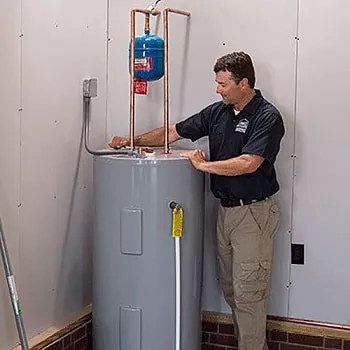Trustworthy Pipe Repair Solutions to Minimize Expensive Water Damage
Trustworthy Pipe Repair Solutions to Minimize Expensive Water Damage
Blog Article
Complete Guide to Water Heating UnitInstallment and Replacement
Comprehending the intricacies of water heater installation and replacement is vital for house owners looking for to make certain performance and integrity in their warm water supply. From selecting the appropriate kind and dimension to carrying out a seamless setup process, several aspects must be considered to avoid typical mistakes. This guide will certainly offer you with the essential steps and understandings to navigate the complexities of this home renovation job, while likewise emphasizing vital maintenance methods that can lengthen the life of your system. As you explore these elements, you might find on your own reassessing your current arrangement and determining areas for enhancement.
Sorts Of Water Heating Units
When taking into consideration hot water heater setup and substitute, it is necessary to recognize the various types of hot water heater available in the marketplace. One of the most common kinds include tank water heaters, tankless hot water heater, warmth pump water heating units, and solar hot water heater.
Tank hot water heater are typical systems that store a specific volume of hot water, making them easily offered when needed. They are normally cheaper in advance however might sustain higher power expenses with time as a result of warmth loss. On the other hand, tankless water heating systems provide hot water as needed, getting rid of the requirement for storage. They are energy reliable and can save room, but their initial expenses are typically greater.
Warmth pump hot water heater make use of power to transfer warmth from the air or ground to warm water, providing considerable energy financial savings however needing even more area and particular installation problems. Solar water heating units harness solar power to warmth water, giving an environment-friendly alternative with possible long-lasting price financial savings, although they typically call for a backup system for over cast days.
Comprehending these alternatives guarantees educated choices pertaining to installation and replacement, dealing with specific demands and choices.
Choosing the Right Size
Selecting the proper dimension for a hot water heater is essential to make certain ideal performance and effectiveness. A system that is as well tiny will struggle to satisfy family demands, causing irregular warm water schedule and raised energy usage. Alternatively, an extra-large water heater can lead to unnecessary energy waste and higher energy bills.
To identify the ideal size, consider the household's top hot water use. This can be calculated based on the variety of passengers and their regular warm water requirements. As an example, a family members of four may need a hot water heater with an ability of 50 to 80 gallons, depending upon the use patterns, such as simultaneous showers and washing.
Additionally, analyze the recuperation rate, which measures how quickly a heater can renew warm water after it has actually been made use of. For tankless models, concentrate on the circulation price, gauged in gallons per min (GPM), to ensure it meets the home's synchronised need.

Installation Process Overview

Next, the old system must be separated and eliminated, taking care to follow neighborhood codes and policies regarding disposal. Once the old system is out, the new hot water heater can be placed in area. This action involves linking the water supply lines, making certain that all fittings are secure and leak-free.
After developing water links, it's necessary to attach the power supply, whether electrical or gas, complying with the producer's guidelines carefully. As soon as all connections are made, the system must be loaded with water, and the power can be turned back on. It's vital to check for leaks and make certain the water heating unit is operating correctly prior to finishing the installment procedure.
Typical Installation Mistakes

One more frequent error is disregarding to follow regional codes and laws. Failing to stick to these standards can not only lead to security threats yet may also result in pricey penalties or the need for costly reinstallation.
Inaccurate pipes links are additionally a common blunder. Stopping working to protect links or making use of the incorrect sort of fittings can result in leaks and water damage. In addition, overlooking the importance of a correct drain pan can result in significant water damage if leakages do take place. Poor insulation of pipelines can lead to warm loss, minimizing effectiveness. By preventing these common installation blunders, homeowners can ensure their water heating system runs securely and successfully, making best use of efficiency and durability.
Upkeep Tips for Longevity
Correct upkeep of a water heating system is crucial for its durability and optimal efficiency. Regular inspections and maintenance can stop costly fixings and prolong the appliance's life-span. Begin by checking the temperature level setup; it ought to typically be set in between 120 ° Find Out More F and 140 ° F for ideal power effectiveness and safety.
Every 6 months, flush the storage tank to remove sediment build-up, which can harm heating performance and cause deterioration. To do this, shut off the heating unit, connect a hose to the drainpipe valve, and let the water run till it is clear.
Anode rods must be inspected every year and replaced when they are rusted. These poles aid stop container corrosion by drawing in harsh elements in the water.
In addition, check the pressure relief shutoff frequently to guarantee it is working appropriately. This shutoff is important for protecting against extreme stress accumulation within the container.
Lastly, think about setting up a specialist upkeep check every couple of years for comprehensive assessments and maintenance. By sticking to these upkeep pointers, home owners can significantly boost the performance, safety and security, and life-span of their water heating systems, guaranteeing trustworthy warm water for several years ahead.
Verdict
Finally, correct setup and maintenance of water heaters are vital for making sure effectiveness and long life (drain cleaning). Picking the proper type and size, sticking to installment standards, and staying clear of typical errors considerably contribute to optimum efficiency. Routine maintenance checks and professional maintenance assistance suffer functionality and protect against expensive repair services. By comprehending these important aspects, home owners can accomplish a reputable warm water supply while minimizing potential concerns associated to hot water heater procedure.
Comprehending the intricacies of water heating unit setup and substitute is important for home owners seeking to make sure efficiency and dependability in their warm water supply.Tank water heating units are typical systems that store a certain quantity of hot water, making them easily available when needed. In comparison, tankless water heating systems provide hot water on need, removing the need for storage space. Picking a water heater that is either as well little or also huge can lead to inefficiencies, resulting in inadequate warm water supply or extreme power usage.
By understanding these vital aspects, property owners can accomplish a reliable hot water supply while reducing prospective concerns related to water heater operation. plumber Denton.
Report this page